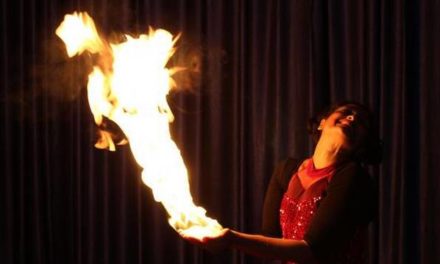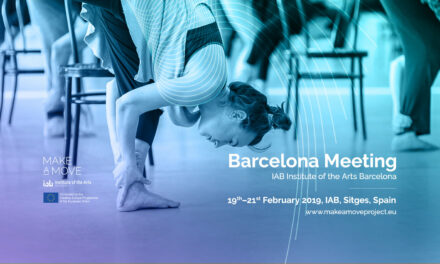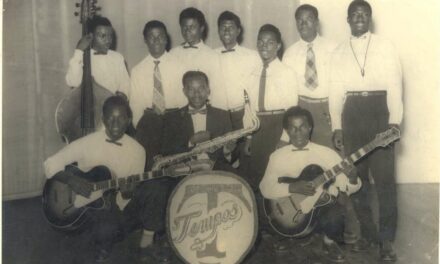ENTRE, is a Portuguese verb in the imperative tense that invites us to enter. That says to us: Enter! Entre.Between.Pomiędzy, a festival that took place in Midwest Brazil in 2022, extended such an invitation. Máskara – the Transdisciplinary Center for Research in Theatre, Dance and Performance – accepted the invitation and entered into a Geography of Imagination with Tomasz Wisniewski and Martín Blaszk from the University of Gdańsk, and Adriana Fernandes from the Federal University of Paraíba.
In keeping with the idea of ENTRE, it could be said that every doorway has its threshold, neither inside nor outside, but between, and every outside has its inside, once again, between. To enter, therefore, is living on the limits, on the border. On this threshold, we started the first Polish/Brazilian meeting in 2022. First, there was the organization that took place over the three months before the festival, after that the choice of space, and then, all the details relating to ENTRE. The first event took place at Escola do Futuro em Artes Basileu França, located in Goiânia/Goiás/Brazil on June 8, 9, 10 and 11, 2022 and then there was a second event at SP Escola de Teatro in São Paulo – SP, Brazil, on June 13th.
Breathe. Breath was the point of entry and the exit to ENTRE – BETWEEN.POMIĘDZY. Pure oxygen, during the COVID-19 pandemic. After months of countless deaths from lack of air, we returned to fill and empty our lungs, even though there was a necessity to wear masks covering both nose and mouth. The air entered our lungs oxygenated and then, little by little left, modified.
Breathing is an act of affection towards ourselves and others. Breathing is shared oxygen. Breathing potentializes our bodies and allows access to sensations and emotions that can be perceived in the embodied gesture of the body-voice relationship. In her workshop, The Voice on Stage – Affections and Emotions[1]In Portuguese: A Voz em Cena – Afetos e Emoções., Adriana Fernandes, proposed a re-encounter with ourselves, of our bodies with our voices, making the act of breathing a vehicle for a walkthrough subjectivity. An organic and non-fragmented whole body. Breathe to find, to find breathing, inhaling and exhaling. A meeting with our own potential, with shared movement and synchronized speech, with colleagues and companions on stage, with our history, culture, colours, flavours, smells and even, a shared Spotify playlist. Enter to find – ENTRE.
Starting on June 8th, in the morning, we entered into a dance of the imagination with, among others, the Polish artist and theatre groups that Tomasz Wiśniewski presented in the first of a series of seminars: Geografia Da Imaginação! Wyobraźni Geography! Geography Of Imagination! Geography permeated the works which were presented, including images of the theatre ensemble Máskara and the radio play Esboço para Rádio 1. Based on a work by the Irish dramaturgist Samuel Beckett, it starred actress Nina Soldera, dressed in yellow, sitting on a bench with a telephone beside her. Such an enaction had previously been presented by Máskara in the event Invasão Maskarada, which took place in various public spaces in Goiânia, in March 2022. The colour yellow, the bench and the telephone all had a symbolic value and entered into a dialogue with each other, the practice of theatre making, and ENTRE.
Tomasz also presented the emblematic figure of Samuel Beckett, the author being one of the links underlying research undertaken by ENTRE. Another author was Tadeusz Różewicz who, along with Beckett, is seen as a representative of what is called Theater of the Absurd. In connection with these authors, Tomasz outlined the main objective of the first meeting of ENTRE: “We discussed to what extent their work is convergent and to what extent the artistic mediums they use carry different meanings. One of the questions that was asked was: ‘Can silence be related to other experiences, when created, in theatre, by these two dramaturgists?’”.
Indeed, silence, along with breathing, looks, encounters and geographical locations, were the central themes of ENTRE. Research on various authors and various locations was discussed: four cities in Poland – Radomsko, Gliwice, Wrocław and Karpacz and four places around the world – Dublin, London, Tunisia and Paris, ending with ENTRE – Goiânia, São Paulo and Gdańsk. Research, people and stages, were all to be found in ENTRE, as well as geography and the theory of many and little known authors.
Stanley Gontarski, an important Samuel Beckett researcher, was the link between the research carried out by the Beckett Research Group in Gdańsk (BRGiG) with professor and director Robson Corrêa de Camargo of the Federal University of Goiás in Brazil. This link also included Máskara, the theatre group from the state of Goiás which visited and performed in Poland in 2018. The Beckett Research Group of Gdańsk (BRGiG) is linked to the Department of Performing Arts Studies of the Institute of English and American Studies at the University of Gdańsk. BRGiG works closely with Beckett scholars in Poland and around the world (Trinity College Dublin in Ireland, the Federal University of Goiás in Brazil, Florida State University in the USA), and with translators and artists involved in Beckett-related work. Therefore, ENTRE was an event that brought together lived experiences, shared views and analyses, with new emergent areas being part of the discussions that took place on the corporal, physical and human qualities.
Surrounded by the magical link that permeates praxis, one which overflows with unique and singular experiences, there was another space that connected the scholars and actors that took part in ENTRE. This was participation in a theatre workshop led by Martin Blaszk, which was titled Geography of the Imagination. This name brings to mind the bodily resonances of the actors and actresses who found themselves in a space, a white box, an area of creation which was also a classroom, but which represented a possible place of transformation of the visible into something not visible to the naked eye. A place that can be felt with each exercise and which also allowed those that took part to experience shapes and geometries based on personal spaces and their connection with the imagination. If the word geography refers to a science that is based on the description of the earth and its relationship with physical and human phenomena, reconciling this concept with the word imagination translates into an intensely subjective and intuitive connection in terms of thinking about the human being. In this case, the human being does not live isolated from his/her thoughts, his/her creation, his/her art, his/her heredity and his/her experiences, but is fully connected to all phenomena, which affects this intense relationship with everything that happens around us.

Martin Blaszk running a workshop activity as part of ENTRE festival. Source: André Miranda.
The participants of the workshop were individuals from diverse backgrounds: actors, teachers, musicians and dancers. Throughout the meetings, they had the opportunity to work on exercises in which they articulated their bodies, objects, texts and images to create individual and collective responses to themes suggested by the seminars presented in the mornings but also areas of personal interest. In this way, the participants worked on a series of vocal exercises based around extracts from Beckett texts or improvised around objects that had special value for them individually. They also used the concept of the “spec-actor”, originating from Brazilian theatre director Augusto Boal’s Forum Theatre, to present an improvisation involving movement, voice and text in which the participants “sparred” to make themselves seen and heard. Throughout the workshop, the participants invested a great deal of energy. Because of this, it reverberated with significant moments and thereby expanded the participants’ artistic, affective and social experiences. All these possibilities intertwined and people collaborated with one another to create new scenic experiments which involved the reinvention of the participants themselves and the creation of strong connections. Later, these possibilities culminated in a happening which was created collectively with all the participants and with a mixture of all the exercises experienced during the three days of the workshop. It was a unique moment of many exchanges and reverberations.[2]These moments were all duly recorded and can be enjoyed on the social media of the Máskara group Website: https://maskaranucleodepes.wixsite.com/maskara. Instagram page: @maskaranucleodepesquisa. … Continue reading The happening was presented on Saturday, June 11th 2022, to an audience that was made up of the artistic network of the city of Goiânia, as well as members of the general public, who wished to participate in ENTRE.
The happening was also part of a greater programme, a Poetical Encounter, that celebrated the 20th Anniversary of Máskara and the 10th Anniversary of the Graduate Program in Cultural Performances at the Federal University of Goiás. This event was organized by Máskara in partnership with the Graduate Program in Cultural Performances from the Federal University of Goiás. It also included meetings, the relationship between Brazil and Poland, between Robson Corrêa de Camargo and the city of Goiânia, between artists and researchers, cultures, arts, people and poetry. Closing the participation of our Polish colleagues in Goiânia activities, our meeting opened doors, windows, portals and maps of the geography of the imagination, established moments of passage and celebrated crossings in a dance of silences, pauses, movements and the sounds of the different languages and dialects that could be heard during the meeting. Stories intersected, they also looked to the past, to the urgencies of the present and to possibilities of envisioning a future-forward on from the event. Between laughter, tears, revolt and caresses, we shared poems, songs, films and performances, and ended the day with a presentation of Quê Onde, a compilation of Máskara performances based on Samuel Beckett’s dramaturgy, emphasizing the link between the theatre collective and the University of Gdańsk.

The final scene from a happening created over three days of workshops as part of ENTRE festival – presented on day four of the festival. Source: André Miranda.
ENTRE also journeyed to São Paulo, Brazil. There were visits to libraries and museums, and conversations about the anthropophagic movement and contemporary Brazilian art. There was also the experience of watching a tropical production of Esperando Godot (Beckett’s Waiting for Godot), by Teatro Oficina Uzyna Uzona, an important theater group from São Paulo. Zona do Oficina brought a reinterpretation of one of Beckett’s most important works in dialogue with the current Brazilian political and environmental situation and Afro-Brazilian religions. Tomasz Wisniewski and Martín Blaszk “provoked” the young actors and actresses from SP Escola de Teatro who took part in an investigation of Samuel Beckett’s universe via Polish theatrical references and through explorations of their own bodies.
What is ENTRE Brazil and Poland? ENTRE Goiânia and Gdańsk? ENTRE São Paulo and Sopot? What bridges can be built? What are the points of convergence and divergence? What unites us besides blood, conversation and the struggles present in our stories? The Polish theater director Jerzy Grotowski said that theatre is an encounter, and maybe because we put faith in his words, after two years of social isolation for “artists of the pandemic,” we opened up the doors and windows to that meeting: ENTRE! And so, for ten days, it was possible to establish connections between performances of culture and art from two very different yet similar countries, as well as to propose new dialogues based on experience, play, theatre and affection. We crossed thresholds. We pushed upon revolving doors, we were and still are ENTRE!
This text was written with the support of Between.Pomiędzy Research Group.
This post was written by the author in their personal capacity.The opinions expressed in this article are the author’s own and do not reflect the view of The Theatre Times, their staff or collaborators.
This post was written by Luis Guilherme Barbosa dos Santos, Mariana Tagliari, Onira de Ávila Pinheiro Tancrede, Robson Corrêa de Camargo, and Ronei Vieira Nogueira.
The views expressed here belong to the author and do not necessarily reflect our views and opinions.
Notes
| ↑1 | In Portuguese: A Voz em Cena – Afetos e Emoções. |
|---|---|
| ↑2 | These moments were all duly recorded and can be enjoyed on the social media of the Máskara group Website: https://maskaranucleodepes.wixsite.com/maskara. Instagram page: @maskaranucleodepesquisa. Facebook page: https://www.facebook.com/MaskaraNucleoDePesquisa/. Youtube: https://www.youtube.com/channel/UCvG4eTSZnC_l9q_xdxjfXgA. |


















